The World Health Organization (WHO) says alcohol consumption globally has slight decrease, but heavy episodic drinking remains prevalent, especially among men.
A new report by the World Health Organization (WHO) indicates that alcohol consumption alone contributes to about 2.6 million deaths each year, while psychoactive drug use leads to an additional 0.6 million deaths. Notably, 2 million of alcohol and 0.4 million of drug-attributable deaths were among men. These substances not only result in deaths but also cause a range of health issues, including mental disorders and chronic diseases.
The report highlights that despite some reductions in alcohol-related deaths since 2010, the overall numbers remain high, particularly in regions like Europe and Africa.
It emphasizes that young people are particularly affected, with alcohol-related deaths highest among those aged 20-39.
‘’ WHO’s Global status report on alcohol and health and treatment of substance use disorders provides a comprehensive update based on 2019 data on the public health impact of alcohol and drug use and situation with alcohol consumption and treatment of substance use disorders worldwide. The report shows an estimated 400 million people lived with alcohol and drug use disorders globally. Of this, 209 million people lived with alcohol dependence,’ the report reads.
Dr Tedros Adhanom Ghebreyesus, WHO Director-General stated that drug abuse places a heavy burden on families and communities, increasing exposure to accidents, injuries, and violence.
He therefore stressed the need for countries to take bold actions that reduce the negative health and social consequences of alcohol consumption and make treatment for substance use disorders accessible and affordable.”
Treatment gap for substance use disorders
On Treatment for substance use disorder, the report indicates they exists but remains underutilized, with significant gaps in access to services worldwide.
It says stigma, discrimination, and misconceptions about treatment efficacy contribute to these gaps.
Actions for progress
To address these challenges, the WHO calls for increased global advocacy, strengthened prevention and treatment capacities, improved monitoring systems, and enhanced funding to support health and social systems in tackling substance abuse effectively.
The WHO’s Global Action Plan for Alcohol 2022-2030 outlines strategies to reduce alcohol-related harm, aiming for safer drinking practices globally.
These efforts are crucial to achieving Sustainable Development Goal (SDG) target 3.5 by 2030, which focuses on reducing substance abuse and improving treatment accessibility worldwide.















